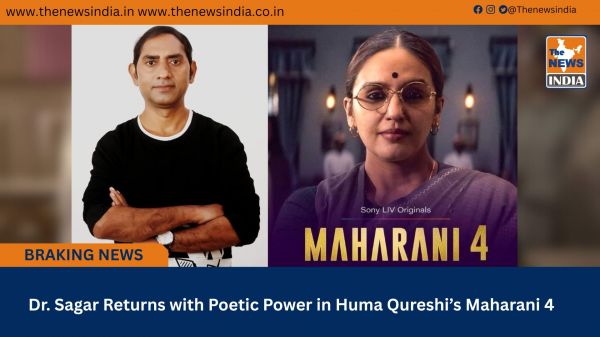"Girls Will Be Girls": A film that presents mental health issues from a new perspective
23-Nov-2024
3396
Girls Will Be Girls movie review: Featuring an electric central performance by newcomer Preeti Panigrahi, director Shuchi Talati's debut film is among the best of the year.
Like its protagonist, director Shuchi Talati’s Girls Will Be Girls is a constantly evolving entity. But behind an outer veneer of control, there is burgeoning angst, a simmering chaos, and a terrible desire to be seen and heard. The psychological drama played to an uncommonly interactive packed crowd at the Dharamshala International Film Festival recently — it was a bizarre screening that exemplified how important it is to watch movies in a community environment. Often, these experiences reveal more about society than the films themselves.
Set in an unnamed hill station boarding school, Girls Will Be Girls follows the 16-year-old Mira, played by Preeti Panigrahi in perhaps the year’s most revelatory performance in an Indian film. Mira’s ingrained conservatism is probably the biggest reason behind her appointment as the school’s Head Prefect. Her duties involve reciting an oath at the morning assemblies — the oath includes something about upholding ‘Indian values’ — and reprimanding fellow students for stepping out of line, sometimes literally. Her slavish devotion to discipline makes Mira both unpopular among her peers, but extremely fascinating to the boys.
She can be severe on the surface, and not above tattling to the principal about her closest friends. But Mira is also incredibly vulnerable, as most young people her age tend to be. The illusion of control that she has given herself is wrenched from her grasp when she comes across a transfer student named Sri. Played by Kesav Binoy Kiron, Sri has travelled the world thanks to his diplomat father, and has now been sent to India to start afresh. He’s charming, well-spoken, and has a warmth about him. But to Mira, who is caught in the throes of adolescence, Sri becomes an object of desire.
An innocent romance blossoms. Glances are stolen on the rooftop during a star-gazing session — perhaps a nod to Harry Potter’s escapades atop the astronomy tower? — and sweet nothings are whispered behind tall bookracks in the library. Unlike most other students at the boarding school, Mira divides her time between dorm rooms and home, where she lives with her mother, Anila (Kani Kusruti). As a former student at the same school, Anila immediately sniffs out what’s happening the moment her daughter mentions Sri. But after issuing a customary warning about distracting boys — Mira has a reputation as a model student to uphold, after all Anila relents, insisting on a meeting before things can proceed.
Eat everything she gives you, she likes that,” Mira instructs Sri before the all-important meeting. And as expected, Sri charms her socks off. An impressed Anila allows her daughter to ‘study’ with him at home, under her perceived supervision, of course. She probably views this as an opportunity to bond with her teenage daughter, whom she feels is growing distant. It’s almost as if she begins to view herself as a conspirator, pulling the wool over strict faculty’s eyes on Mira’s behalf. But a part of her wants to relive her girlhood vicariously through her daughter; a girlhood that she was presumably denied by her own parents. And this is when the film takes an unexpected turn.
As Mira and Sri’s puppy love evolves into, as she puts it, ‘big-dog love’, Talati introduces a rich new layer to their relationship. Sri begins to spend more and more time at her home, and gradually, appears to grow closer to Anila as well. It begins innocently enough, with them having conversations independently of Mira, sharing refreshments while she studies alone in her room — Anila appears to almost be oblivious of her daughter on some occasions — but a few weeks later, their interactions take a downright sinister tone. Lines are most definitely crossed, especially during a sleepover when Mira puts her foot down and refuses to relinquish her room. As tensions escalate between mother and daughter — neither of them seems to have the vocabulary or the wisdom to really understand what’s happening — Talati’s precise filmmaking does most of the talking.
The sudden burst of moral ambiguity elevates Girls Will Be Girls into something more special than a plain-old coming-of-age movie. A character who would’ve remained a supporting presence otherwise is given a great deal of complexity by Talati, whose immaculate framing and fixation on hands — yes, hands — enhance the perverse thrills that she is able to conjure through silences. And as she displayed so wonderfully in the acclaimed All We Imagine As Light, Kusruti makes for a haunting presence — a perfect foil to the delicate hope that Panigrahi projects on screen. The young actor is so evocative as she shoots daggers at Kusruti, separated by walls, peeping through cracks in the door, in close proximity but visibly disconnected.
The tonal tightrope walk would’ve tripped more seasoned filmmakers. But Talati displays incredible restraint in her storytelling. She judges neither Sri nor Anila in the latter half of the film; nor does she abandon Mira — both in school and at home. Instead, she aims for broad empathy, highlighting the loneliness that inspires human connection in the most unexpected of circumstances. (Agency)


.png)
.jpg)

.jpg)

.jpg)

.jpg)
.png)



.jpg)

.jpg)
.jpg)
.jpg)
.jpg)
.jpg)


.jpg)
.jpg)
.jpg)
.png)
.png)
.jpg)
.png)
.png)
.jpg)
.png)
.png)


.png)
.png)


